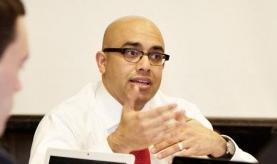
 Rational Actors in Sharīʿa?: An Interview with Professor Anver Emon Senior scholar Anver Emon spoke with SHARIAsource Research Editor Sharon Tai about the role of the state and rationality in Islamic law. Speaking as a legal historian, Emon discusses how the misunderstandings of Islam have led American foreign policy to interpret Islam and sharīʿa as an ideology, leading to failures of foreign policy that mimic those of the Cold War. He points out the fallacy of this reduction by calling the idea of “obedience to the divine” found in Islamic law as “not the site of irrationality, but rather the site of creative rationality,” one that deals with the “epistemic gap” between knowing that one cannot know the divine law and attempting to create a moral legal system that aims at its ideals nonetheless. To find out how, read more. Image credit: http://www.anveremon.com/
Rational Actors in Sharīʿa?: An Interview with Professor Anver Emon Senior scholar Anver Emon spoke with SHARIAsource Research Editor Sharon Tai about the role of the state and rationality in Islamic law. Speaking as a legal historian, Emon discusses how the misunderstandings of Islam have led American foreign policy to interpret Islam and sharīʿa as an ideology, leading to failures of foreign policy that mimic those of the Cold War. He points out the fallacy of this reduction by calling the idea of “obedience to the divine” found in Islamic law as “not the site of irrationality, but rather the site of creative rationality,” one that deals with the “epistemic gap” between knowing that one cannot know the divine law and attempting to create a moral legal system that aims at its ideals nonetheless. To find out how, read more. Image credit: http://www.anveremon.com/
 Legal Entrepreneurs in the Halal Industry: The Case of Sharīʿa in China China editor Matthew S. Erie assesses the Chinese government’s attempts to legally respond to its Muslim Hui population’s calls for greater regulation of halal food to accommodate this group of over 10 million Chinese citizens who identify as Muslim. In Erie’s estimation, both the call and response counter the original secular intentions of a socialist legal system. As the Muslim concerns grow for regulation in line with Islamic law, the PRC wishes to treat all its citizens the same: as a religious citizens. With that wish becoming untenable, do questions of Muslim minorities in China become one of contemplating legal pluralism and ensuring domestic peace? Read more. Image credit: Xiao Lu Chu, Getty Images
Legal Entrepreneurs in the Halal Industry: The Case of Sharīʿa in China China editor Matthew S. Erie assesses the Chinese government’s attempts to legally respond to its Muslim Hui population’s calls for greater regulation of halal food to accommodate this group of over 10 million Chinese citizens who identify as Muslim. In Erie’s estimation, both the call and response counter the original secular intentions of a socialist legal system. As the Muslim concerns grow for regulation in line with Islamic law, the PRC wishes to treat all its citizens the same: as a religious citizens. With that wish becoming untenable, do questions of Muslim minorities in China become one of contemplating legal pluralism and ensuring domestic peace? Read more. Image credit: Xiao Lu Chu, Getty Images
 The Limits of State Religion and Non-Muslim Minorities: The Moroccan ‘Baha’i Affair’ of 1962 Amidst the tensions raised by Islamic constitutional states as they deal with non-Muslim minorities, worth considering is how Muslim-majority states have resolved the issue in the past. Morocco editor Ari Schriber considers the political ramifications of Islamic laws governing religious minorities in an episode that faced Morocco as it gained independence: Morocco’s 1962 Baha’i Affair. Morocco’s then-recent independence heralded a progressive government set on both protecting non-Muslims and affording Islam priority as a state religion. Schriber uses the Baha’i Affair to exemplify the tension between these two governmental aspirations, and to discuss how this tension resonated with legal and communal structures in its aftermath. Read more. Image credit: stock-clip.com
The Limits of State Religion and Non-Muslim Minorities: The Moroccan ‘Baha’i Affair’ of 1962 Amidst the tensions raised by Islamic constitutional states as they deal with non-Muslim minorities, worth considering is how Muslim-majority states have resolved the issue in the past. Morocco editor Ari Schriber considers the political ramifications of Islamic laws governing religious minorities in an episode that faced Morocco as it gained independence: Morocco’s 1962 Baha’i Affair. Morocco’s then-recent independence heralded a progressive government set on both protecting non-Muslims and affording Islam priority as a state religion. Schriber uses the Baha’i Affair to exemplify the tension between these two governmental aspirations, and to discuss how this tension resonated with legal and communal structures in its aftermath. Read more. Image credit: stock-clip.com
See the full newsletter.

